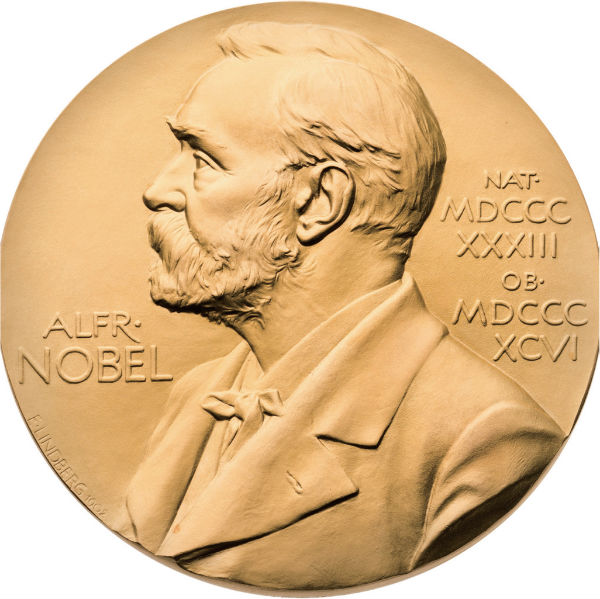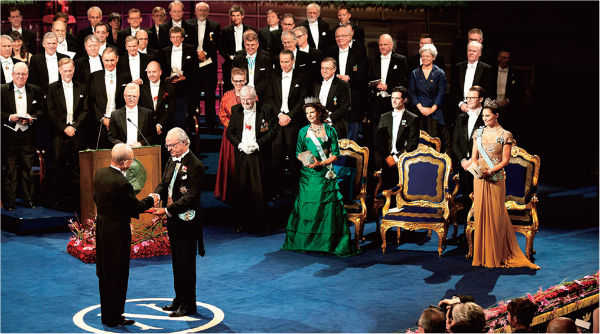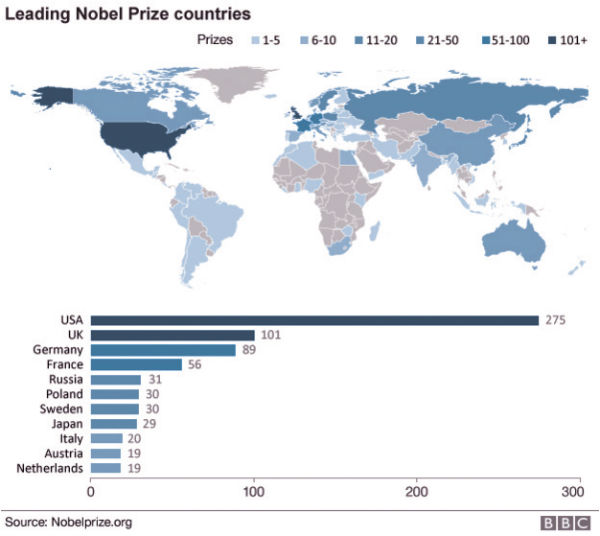
In December, various kinds of award ceremonies are held around the world. Among them, the most eye-catching ceremony is the Nobel Prize Award Ceremony. With the ceremony approaching, the awarding of the Nobel Prize in Literature to singer Bob Dylan is currently a hot potato. Some insist that this selection is meaningful in that it expands the scope of literature, but others worry about the standard becoming vague. No one can tell for sure which argument is right, but some controversies are arising these days. The Sungkyun Times (SKT) informs Kingos of the origin of the Nobel Prize, details of the Prize Award Ceremony, and the controversies surrounding the prize, along with the reality of Korea’s obsession with Nobel Prizes and the prospects to meet.
Explanation about Nobel Prize and Awards Ceremony
Do you know the origin of the Nobel Prize?
The Nobel Prize is a prestigious award which is acknowledged all around the world. One day, when Nobel’s older brother died, some foreign media bodies misunderstood it as Nobel’s death. Admiring the work of Nobel, the journalists described him in articles as the “merchant of death,” referring to the dynamite, his key invention, as a mean of killing and the fact that he had made an enormous amount of money by selling it. Nobel was shocked by this expression, because he never wanted the dynamite to be used for such a lethal purpose. Therefore, he decided to donate 94% of his property, $186 million, and left a will to establish the Nobel Prize Foundation with it. The ultimate purpose of the annual Nobel Prize is to give an award and prize money to people who contribute the most to the development of mankind. In the testamentary will, Nobel emphasized that the award should be given regardless of nationality. In addition, he passed onto Norway, which was a Swedish colony at the time, the duty of awarding the Nobel Peace Prize. Although he was criticized for giving Norway the opportunity of the award, there are some speculations about the reasons Nobel did so. Firstly, the action is regarded as a measure for peace between Sweden and Norway, as the request for independence of Norway against Sweden was getting stronger at the time. Secondly, since Norway was considered to have the most democratic council in the world, Nobel might have thought that Norway would fairly choose the laureates. At the time, as Sweden was swept by sentiments of extreme nationalism, Nobel was strongly condemned by the media and the Prime Minister of Sweden. Different from the thoughtful intention of prize itself, it faced many difficulties until the complete settlement into society.

Details of Nobel Prize Awards Ceremony
The fields of the Nobel Prize Award were originally composed of physics, chemistry, medicine, literature, and peace. Since 1969, as economic sciences was added, the number of the fields is now six. Nobel Prize laureates are announced in October annually, and the awards ceremony is held on December 10, the anniversary of Nobel’s death, each year. There are special standards for receiving the award. Only living people are qualified to receive the prizes and a maximum of three people can get the award in one field. Interestingly, however, in the Nobel Peace Prize, organizations can also be given an award. For the laureates, a gold medal and the prize money offered by the interest of the Nobel Prize Foundation are given. The prize money reaches eight million Swedish krona, about one billion won. Only the Nobel Peace Prize ceremony is held in Norway, while all the others are awarded in Sweden. The institutions that issue the prize per each field of study are as shown below.

Representative Controversies of Nobel Prize
As the meaning of the Nobel Prize itself is getting blurred these days, new controversies are also arising at the same time.
Natural Science
Conservatism of Nobel Prize Award
· Glass Ceiling in the Nobel Prize, Sexual Discrimination?
From 1901 to 2015, the number of female laureates totalled to 48 out of 870 total, accounting for only 5.5% of all individual laureates. This year as well, there were no female laureates in any field. Even though there were some female laureates in the past, they could not receive complete trust from society, and the conferment itself was inclined to specific fields, like literature. Conversely, the performance of female laureates in the natural science area is rarely prominent. In chemistry, there are only four females among 171 laureates, and 12 females among a total of 211 medicine laureates. Lise Meitner, a female physicist who first discovered nuclear fission in uranium, is regarded as one of the victims of this sexual discrimination. She researched nuclear fission with a male collaborator, Otto Hahn, but only Hahn was awarded the prize, without even a joint award being given to her. The controversy over sexual discrimination is still on-going. Toward this problem, some foreign presses ridiculed the laureates of natural sciences and even referred to them as a “males club.”
Humanities and Social Sciences
Ambiguity of Standard of Selection
The information about the selection of laureates must be kept secret for 50 years after the awarding ceremony, and even after the 50 years pass, it can only be unveiled through an adequate judging process. Therefore, citizens around the world can only know the result, not the process. Controversy is especially prevalent in the humanities and social sciences area because the achievements for this field are trickier to evaluate than those of natural sciences.
· Nobel Peace Prize
As the Nobel Committee for the Nobel Peace Prize concentrates on the recent issues in international society, it tends to award prizes even though an individual or an organization did not achieve a complete result. Differences in opinion between individuals and the nations may also occur. In other words, some performances can be beneficial for specific individuals, but not for others. For example, Theodore Roosevelt, a United States (US) president, was given the Nobel Peace Prize due to his contribution in mediating the Russo-Japanese War. The judging committee considered this meaningful in that he had stopped the war, but was regarded as irrational by the Koreans. During the process of mediating the war, Japanese sovereignty over Korea was accepted without Korea’s consent. Therefore, no one can be fully certain of the accuracy and fairness of the Nobel Peace Prize standards.
· Nobel Prize in Literature
The Nobel Committee is suspected of having unclear distinctions, as laureates are not limited to authors. Historically, politicians and philosophers were also given the Nobel Prize in Literature. Although some might argue that the backgrounds of laureates are becoming diversified along with the widening spectrum of literature, it deprives the opportunity of conferring the award to fully qualified writers. Therefore, the field of literature also has unclear selection and judgment standards for laureates.
Controversies Ranging Over All Areas
The Rule of Not Nominating the Dead as Laureates
Henry Moseley was a physicist from England, and he rearranged the periodic table of elements into the one with which people are most familiar today. Although he was almost confirmed to be awarded, he died while fighting in World War I, and his feat was brought to the naught. This situation is not an isolated incident. In Korea, there was a man referred to as a genius physicist, named Whi-Soh Lee. He collaborated with Steven Weinberg and they were almost nominated to get the Nobel Prize in Physics. Due to a car accident in 1977, however, Lee died, and the award was only given to Weinberg, who stated that the prize which he was given should have actually been given to Lee. Even though the prize can be important for someone, the effort and passion of the dead should not be forgotten and blurred.
Discrimination Against Certain Nations
Most of the past imperialist nations or hegemons nowadays are occupying the top ranking at Nobel Prize. The US, England, Germany, France, Japan, and Russia are such examples. Many of the judges in the Nobel Committee are also from these nations. Although laureates sometimes come from India and China, they are very few compared to the two nations’ dense population. Laureates from past colonies are even rarer. While it is true that the educational standards and learning environments differ greatly by country, thus making it difficult to accurately assess the discriminatory nature of the selection, the possibility of structural problems cannot be ignored.

The original purpose and influence of the Nobel Prize is becoming questionable in the international society along with those controversies. Although the arising controversies are also a serious issue, Korea continuously does not give up the desire to get the Nobel Prize. Korea continually sows to reap fruits, and while a bountiful harvest is ideal, the most important factor is cultivating the soil, namely the environment. Korea has some problems regarding this aspect.
What should Korea aim for?
Reality of Korean Consciousness Obsessed with Getting Awards
· Performance-Oriented Culture
As the standard of evaluation for nominations in Korea is the amount of published theses or citation counts, most researchers fill their research proposals concentrating only on fulfilling these criteria. Meanwhile, the government’s support towards researchers comes only in the form of financial budget, without any other means of help. Therefore, Korea tends to focus on short-term industrial researches that are beneficial for the economy rather than long-term and fundamental learning. Randy Schekman, a laureate of the Nobel Prize in Medicine said that he was shocked by the proposals that the Korean researchers submitted, as there were no standards for proposal, and many researchers only aimed to publish their theses in famous academic journals. Additionally, comparisons to other nations are also a problem. Korea is obsessed with numerical results such as the number of prizes won and rankings among other nations. Most Korean media are especially focused on the laureate comparison to its neighboring nation, Japan. Encouragement and acknowledgement towards the individuals’ effort and process is highly deficient.
· Boiling Pot Syndrome
“Boiling pot syndrome” is a term that expresses the somewhat impatient and inconsistent temper of Koreans. Koreans tend to concentrate on the media only for a while, when a specific case becomes a social issue. What is worse, this syndrome prevails in every area. A book titled The Vegetarian, published by Korean writer Han Kang in 2007, was given the Man Booker Prize this year. Although the sales volume for this book seemed dull in the past, after receiving the award, sales have increased by more than 30 times. Furthermore, the issue of whether Ko Un, nominee for the Nobel Prize in Literature, would be awarded a prize or not is also a topic of interest every Nobel Prize season, but soon the discussion becomes silent. This impatient characteristic of Koreans leads to a vicious circle of continuously being unable to conduct profound exploration in one field.
· Change in consciousness is needed
Fundamentally, there is a need to establish an educational environment that respects individuals’ interests and potentials. Prejudice towards unpopular and independent fields of study should also be gradually removed. Meanwhile, the focus of public interest leaning towards natural sciences should be expanded to the field of humanities and social sciences as well. Furthermore, not only researchers and writers, but also the government, press, and all the citizens who made this environment should take responsibility. Most importantly, Korea should aim for the long-term development of human civilization.
The Nobel Prize is a prestigious award acknowledged globally and covers a wide spectrum of academia. As various controversies have risen, however, the trust towards its objectivity and purpose is becoming blurred. Nevertheless, Korea’s tendency to only care about results harms the passion and efforts of researchers, spoiling long-term achievement. Right now, when people all around the world are concentrating on the Nobel Prize ceremony, Korea needs to contemplate on the fundamental problem that hinders the progress of learning-based research and the ways to realize welfare.
